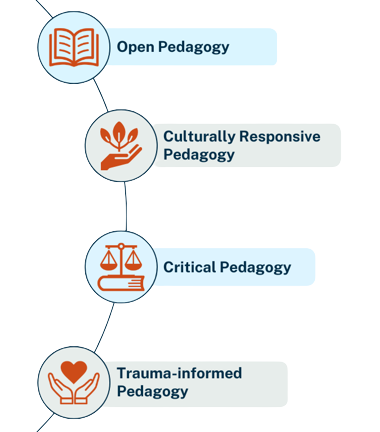Aligning your Pedagogy with Equity
As you design and create your OER, there are a few considerations to think of along the way, including knowing yourself and knowing your students. Earlier in ethical storytelling (link back to this section), we mentioned that it’s good practice to reflect on your positionality as it relates to storytelling. Ask yourself the same questions, only now consider how that impacts your pedagogical approach:
What is the storyteller’s relationship to the story and how is the narrative impacted by that?
Whose voices are centered and whose are excluded?
Whose stories are being told? What is the narrative being told?
It’s key to remember that while you are creating an OER, it is merely a tool and OER-enabled pedagogy does not equal equitable pedagogy. We can still replicate harmful beliefs and practices in open education. To create positive change within the classroom and more generally in education, pedagogy needs to centre equity. But what does that look like?
In Designing for Care, the authors explain how “imagining better pedagogies is the first step in creating a powerful learning environment.” In this case, better pedagogies go beyond the delivery of course materials. It “means more humanizing pedagogies that embrace the fact that the people in our learning environments are fantastic, curious, unpredictable, capable, and multi-layered.” (Jerod Quinn; Martha Burtis; Surita Jhangiani; and Catherine J. Denial) Pedagogies that emphasize our shared humanity leave room for the cultivation of skills and knowledge for both students and educators by interrupting traditional pedagogical practices and promoting collective learning. “Imagining better pedagogies is the first step in creating a powerful learning environment.”
There are so many different types of pedagogies, some more equitable than others. Below is a short list of just a few. As you read through these, consider what you like and dislike about each one, and notice any overlaps or gaps. Think about what’s similar and what’s different to your current pedagogical approach. Are there pedagogies you haven’t considered until now? Are there equitable pedagogies not listed here?

Open pedagogy is rooted in the belief that education should be accessible, participatory, and empowering for all learners, and that openness and collaboration are key to achieving these goals.
Culturally-responsive Pedagogy identifies and nurtures students’ unique cultural strengths to support student success and well-being. Student learning, cultural competence, and critical consciousness are the three essential components of culturally relevant education that Dr. Gloria Ladson-Billings (1995) lists.
Critical pedagogy is a theoretical framework that emphasizes critical thinking, social justice, and the promotion of democratic values. As such, teaching is a political act that can engage teachers and students in dialogue about existing power structures and the ways in which to address oppression in education.
Trauma-informed Pedagogy is a method of teaching that is dedicated to understanding the various traumatic events that students may encounter and validates how these may affect their ability to learn (Imad, 2021).
Pause & Reflect on your Teaching Impact
Every day as educators we must ask ourselves crucial questions:
- How does my teaching style integrate into my curriculum and course design?
- Does my teaching style uplift or suppress diverse perspectives?
- Does my teaching style invite critical thinking and/or feedback?
Action Plan: Enhance your Syllabus
Step 1: Browse the following website on inclusive and equitable syllabi design from Indiana University Bloomington and take notes of the suggested changes to specific syllabi foci, language and policies.
Step 2: Access and open a syllabus document you have been working with recently (either as recipient, creator, or to provide feedback/ approval). What changes would you suggest or make to this document with regards to what you’ve learned about student-focus, UDL, language and supportive policies?
Resources:
Elder, A.K. (2019). The OER Starter Kit. Ames, IA: Iowa State University Digital Press. DOI: https://doi.org/10.31274/isudp.7
Imad, Mays. (2021) Transcending Adversity: Trauma-Informed Educational Development. To Improve the Academy, (39), 3. http://dx.doi.org/10.3998/tia.17063888.0039.301
Ladson-Billings, G. (1995). Toward a theory of culturally relevant pedagogy. American educational research journal, 32(3), 465-491.
Margolis, May-Varas, and Mead. Educational Learning Theories: 3rd Edition (2022). Education Open Textbooks.
Quinn, J., Burtis, M., Jhangiani, S., & Denial, C. J. (2022). Designing for Care. Hybrid Pedagogy Inc. Retrieved from https://pressbooks.pub/designingforcare/
Media Attributions
- Pedagogy Diagram © Kaitlin Schilling is licensed under a CC BY (Attribution) license

